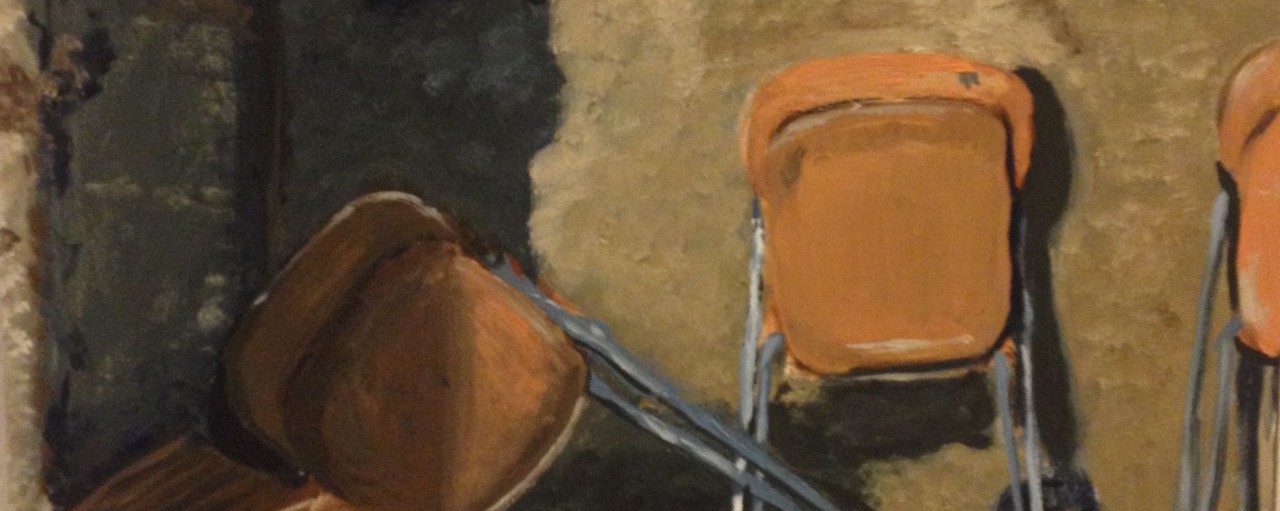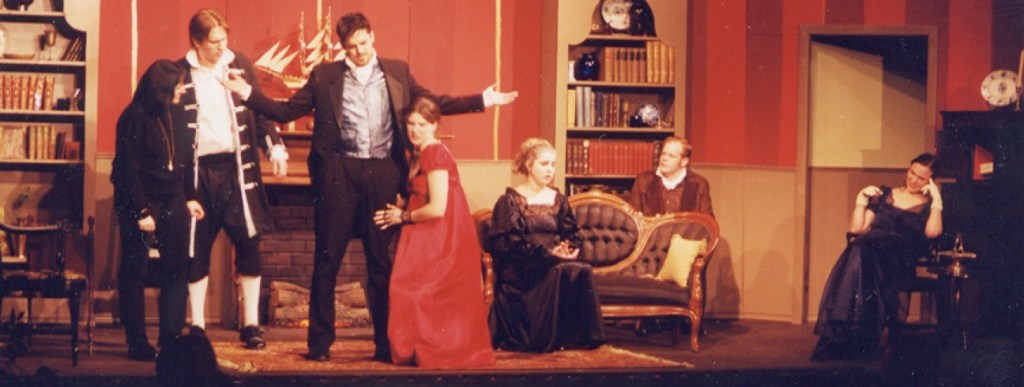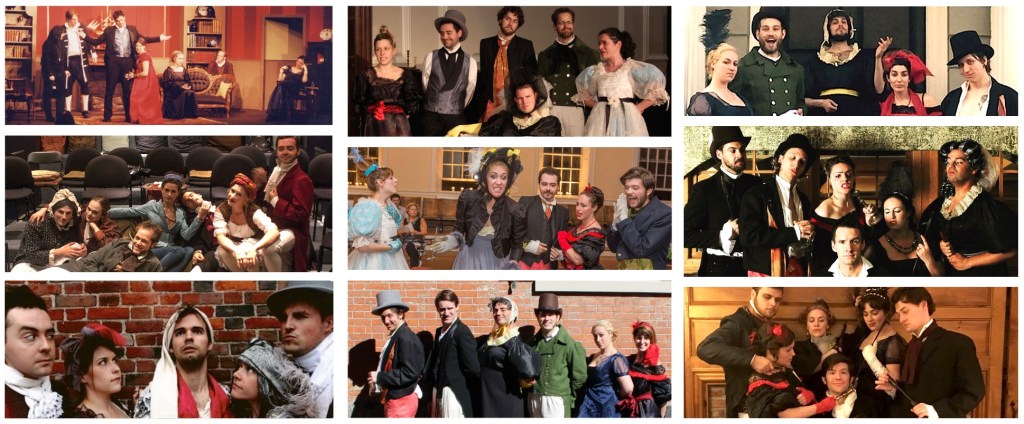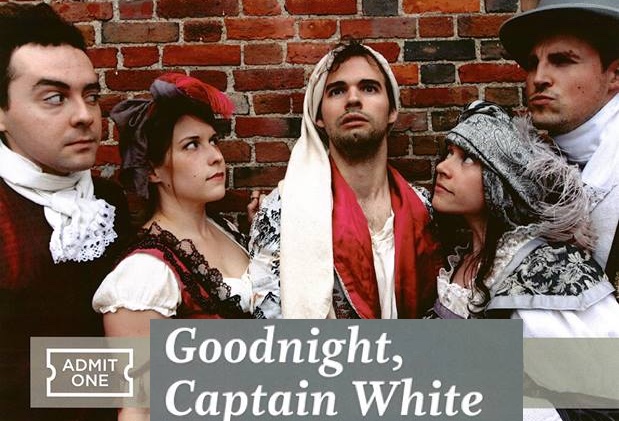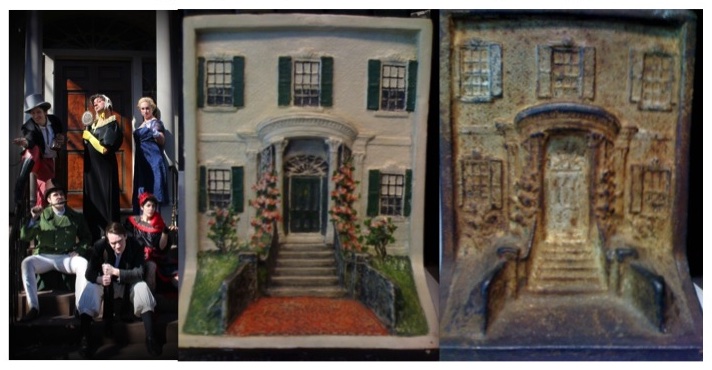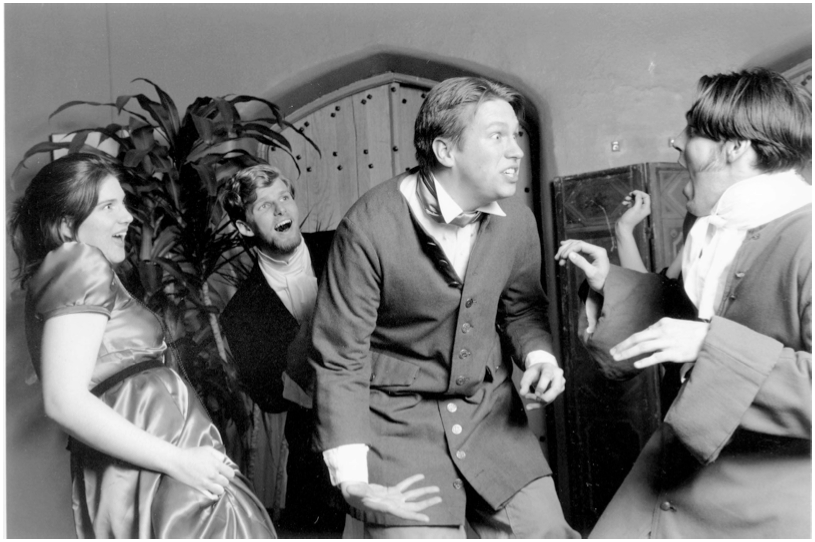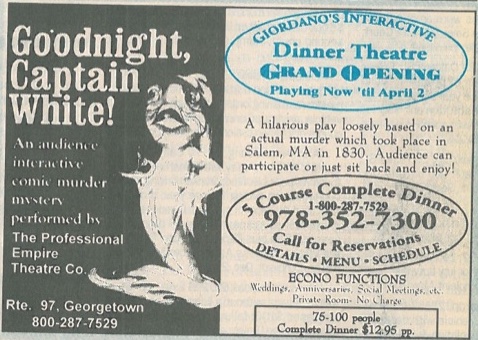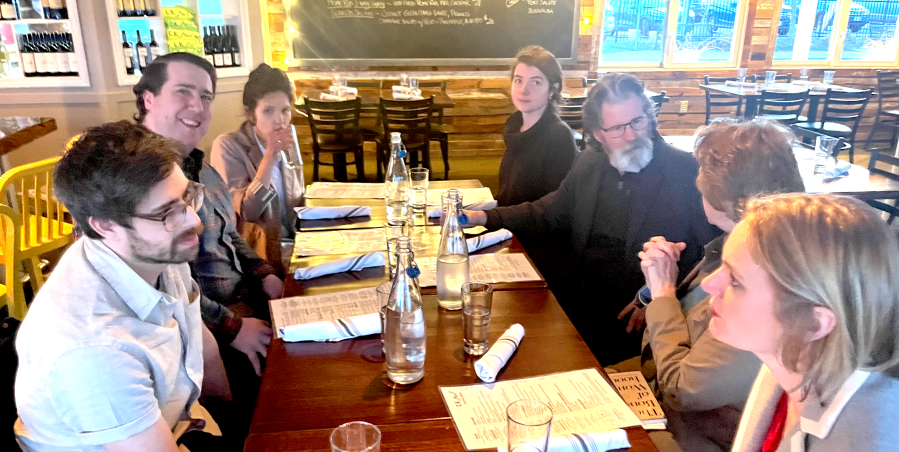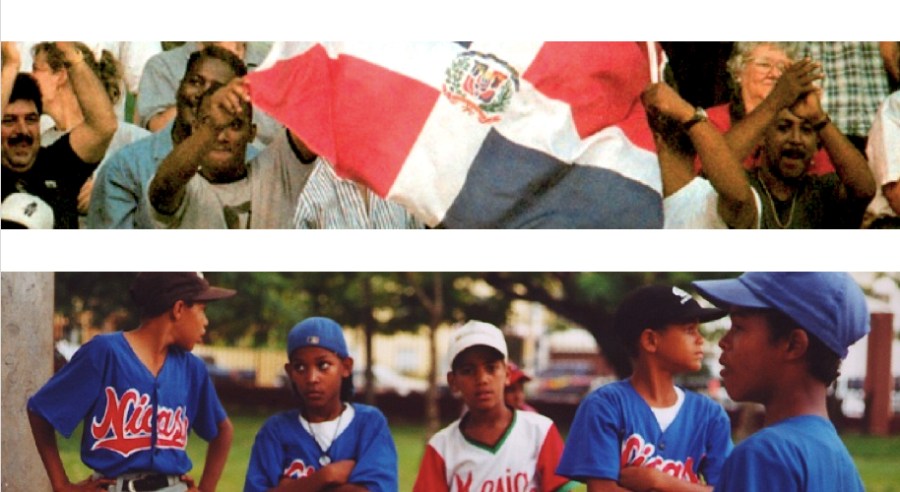
NORM MAN OF DRAMA the Spoofical – songs adapted by MWS from Man of La Mancha by Wasserman, Leigh & Darion
-a clip from the final song is here | a scratch version of all the songs is just below-
MARK: Let us begin by thanking the many of you who suggested songs to adapt for a roast & toast of our man Norm. We got a bunch of Jones songs: Tom Jones’ “It’s Not Unusual to be Loved by Anyone;” Billy Paul’s “Me and Mrs. Jones,” good one, obviously; George Jones’ “She Still Thinks I Care”; Norah Jones’ “Don’t Know Why [I didn’t come to his your show]”; Larry Norman‘s, “I Wish We’d All Been Ready” (everyone got trampled on the floor… epic line, perfect for the ending of Hamlet); and Jack Jones‘, “The Impossible Dream” (as if we’d do that one).
One of our STEM profs (you guess who, it was Craig) wrote lyrics to a Rush song, “Cinderella Man”—here they are…
Hey, Norman, man / directing in a can / hope they’ll understand / your new scenes.
How did we resist? Someone else thought we should hire James Taylor to sing some adapted lyrics for Norm (they share a birthday, March 12)—great idea. ♫ Whenever I see Norm’s smiling face, I have to smile myself, because I love Norm.
Somehow we turned away from all these great ideas, and maybe toward adapting a Broadway musical to Norm’s life. (Sure, that’s easy to do.) Some of those suggestions: Guys and Jones, Normoucel, Chica-jones, The Music NormMan, The Book of Norman, Normlight Express, A Little Norm Music, Joneseph and the Amazing Technicolor Normcoat, Normelot, Norma Mia, and, of course, Norman Jones Superstar. Tempting.
Actually, many of these could work—and I kinda feel like we want to sing a bit, do we? OK, let’s go for it. Here are some possibilities; ready?
from The King and Guide Jones: ♫ “Getting to know Norm, getting to know all about Norm, getting to like Norm, getting to hope Norm likes me”
from Normklahoma: ♫ “O what a beautiful Norming, O what a beautiful day, I’ve got a beautiful feelin’ – everything’s Norming my way”
from South Panormphic: ♫ “Some Norm-chanted evening, you may see a Joneser, you may see a Joneser across a crowded room”
from My Fair Jonesy: ♫ “I could have Jonesed all night, I could have Jonesed all night and still have Jonesed some more” [wish we hadn’t sung that]
from Normy Poppins: ♫ “Norm-Normany, Norm-Normany, Norm-Norm Norm-ee, Norm Jones is a lucky, much luckier than me”
and again, Normy Jonespins: ♫ “Just a Norm-ful of sugar helps the metaphor go down {repeat} in the most delightful way”
An embarrassment of riches here, paralyzed by the musical possibilities. Then we remembered: in ancient days, before he knew Into the Woods, Norm loved a musical: Man of La Mancha—so much, in fact, that when WE began working together in 1989, Norm named our b/w printer Don Quixote and our color laser printer Dulcinea. Those printers clinched it; bc of them, and because of Cervantes, I talk like a Spaniard now, somewhat ill-advisedly, sí:
We shall celebrate a man:
Come, enter into our reminiscence and see him: back then,
30, Houghton-faced, eyes that churn with the fear of unemployment;
He conceives an urgent proposal-and-cover-letter—
To become a direct-ant
and enter stage right the world of academia.
His name-to-be? Prof Theatre-Man-of-Drama!
__
“I’m That Guy, Prof. Theatre”
JACKIE MEERS: “Hire me now!” says his headshot, a clean-shaven face
And a skinny, all-acting CV;
Howard’s office is empty—could this man replace
G. Lloyd and Kevin Lockerbie?
PREZ JUD: Hire that guy, Norm from Kingsley—
A master’s in drama!—
Saul Elkin said, “Where you been, bro?”
As a Youth Min. from Houghton
He’ll silence the doubters
Who think actors hail “from below”…
This one’s from cold Buffalo;
Eastward to Gordon he’ll go!
SIDEKICK: I’ll watch you,
I’ll repatch you,
With canvas and plaster and lauan,
I’ll help build your worlds soundly:
I’m his sidekick—ex-student.
STEVE/NORM: At the foot of a lecture hall jutting from Winn,
Where the freshfolk are bored and core-classed,
A miraculous windmill will soon start to spin
When “Mundane at Seven” gets cast…
NORM: I’m that guy, Prof. Theatre, SIDEKICK: (I’ll watch you)
The Norman of Drama! (And I’ll catch you with)
Lionel Bas-ney helped me emote. (ladders and flats and el bracket)
From my mild Merritt Island (I’ll help build)
I journeyed to Fancher, (Each world soundly)
Then quested to cold Buffalo… (I’m his hire—ex-student)
BOTH: Weather’s so cold—tons of snow.
Warmward to Gordon—let’s go!
__
MARK: “Warmward”? Temperature-wise, Gordon was the same as Buffalo in 1985. But the climate toward the arts needed to thaw a bit—and perhaps had just begun to, thanks to Dick Gross, the president who hired our man, and even more to Jud and Jan Carlberg—Jud who was dean of faculty, and who became prez in ’92; it was Jud who said Yes to a Department of Theatre (surely thanks to Jan). But when Norm arrived, theatre was still programa non grata and mostly viewed with doubt-&-fear by The Faithful. It appeared as “speech” or “speech and drama” in English programs (see Norm’s Hypernikon picture). And that’s the theatrical winter his new students, his discontents, were dressed for in 1985—not daring to hope for a glorious summer through this son of New York…
“Let Drama Reign”
ALL: Fool? Wise? Norm Jones-a! Norm Jones-a!
Be made fun of! Be made fun of!
He may, Norm Jones, be made fun of!
RACHEL: My school’s fine arts are fine but smothered,
We stage dramatic skits in Lane;
Spring breaks our players tour to southern
Concrete cities, ágain, agáin.
Our elders scorn imagination,
They view “pretending” with disdain,
Want “English oral interpretation”
To educate, not entertain.
ALL: So who’s this fool who speaks his love,
Love for the Stage—is this fool wise?—
For whom catharsis is the plan
To incarnate the Mysteries…
If he could help our hearts discover
Miraculous things in mundane,
See the beleaguered muse and love her,
Move Wenham Wood to Dunsinane.
ALL: Will this new charmer launch a school
Decades before Prof. Dumbledore?
And might he cast dramatic spells
Before he owns a wand of power?
Could we all yearn, before it’s died out,
For what a child can ascertain?—
Truth’s a Great Hall and not a hideout;
Let drama reign. Give the fool rein!
ALL: Norm Jones-a!
__
MARK: The fool did reign. Or he “made it rain.” Or he took the reins—did you know Norm knows horses?—thanks no doubt to his Uncle Max, he can fettle—he can shoe a horse if needed. An apt metaphor: Horses are all flicker and power, and danger and grace—like students, like actors, needing training, discipline, good shoes (maybe cothurni, those platform shoes worn by Greek tragedians). We students arrived like colts, dolts, idiots, really, our tales/our tails full of sound and fury and—till he got busy with hammer and hooflutz—signifying nothing.
“An Idea” (vid here)
STEVE-as-NORM: First, your scenes are too long,
And there’s nothing uniting the vast individual parts.
STUDENTS: What are we doing wrong?
STEVE-as-NORM: You’re committed, you’re loud, but there’s still
Something missing at heart:
An idea. An idea—
It’s your help and only hope, like Princess Leia…
One that guides each further choice—see Stanislavski:
ALL: The Idea…
STEVE-as-NORM: Your eureka.
[discussion, agreement]
STEVE-as-NORM: Now in “Twelfth Night” you need…
STUDENTS: A location near water where everyone captures a spouse.
DAN: We were hoping that we’d
Somehow end with Malvolio stuck in a tiny outhouse…
STEVE-as-NORM: Dumb idea.
ALL: Bad idea.
DAN: I was thinking he’d be sick with emphysema.
STEVE-as-NORM: What if you would set the whole shebang in—
DAN: …Venice?
STEVE-as-NORM: Nice idea.
STUDENTS: Mama mia!
__
MARK: Everything must support the idea of the play, said Peter Brook, whom we heard say more things like this at the National Theatre in London. London’s where we also saw three superlative productions of “Twelfth Night,”
(1) where Mark Rylance’s first line as Olivia, “Take away the fool,” got the biggest laugh in history of theatre,
(2) where Desmond Barrit as Malvolio came downstage to show his counterfeit letter all-the-way-to-us in the very last row of the Barbican theatre, and
(3) where David Bradley (Filch) as Sir Andrew Aguecheek – tell us, Norm. [Norm relates the story of a drunk Aguecheek staggering onstage and then staggering backward all the way out without ever speaking a word.]
We still call that one The Perfect Production, one against which all others are measured. Norm’s recent production of “Into the Woods” just measured up and earned that appellative. That show, and each of his shows require its 10,000 hours—of rehearsal, yes, and of memorization. Gotta learn your lines! You off book? I’m not off book, we’re supposed to be off book. Line. Line!
From “The name of this play is Our Town” to “You get a good rest, too,”—the question is always, how do you memorize all those lines?
“I’m Always Learning My Lines” (vid here)
JERICA: I’m always learning my lines.
ALL: I’m always running my lines,
Whenever I am in his play
I’m always pounding my lines.
JERICA: Once they asked me in OT
To quote Psalm 23;
I said, “Yea, I walk through anoint my head with my lines.”
JASON: When my friends invite me northward
To the slopes of Sunapee,
I can only say “My quandary
Is to ski or not to ski?”
MALACHI: When my buddy says—
BRIAN JASON: “We’re failing, we should make a study group,”
MALACHI: I remind him firmly I am more
Afraid to fail The Troupe!
Et tu, Buddy?
No can study—
Anything but Norm’s all-consuming play…
ALL: I’m always mumbling my lines,
I’m always fumbling my lines.
I’m sometimes screaming and often dreaming my lines.
EMILY: I was by myself declaiming
(All my tricky lines to con),
When a Gopo cop approached me
And inquired what drug I’m on…
CHARLIE: At Chipotle with Sharona,
She was feeding me my cues, then she said,
HANNAH: “I think I love you,
And I hope you love me, too.”
CHARLIE: And that was fine.
But I said, “Line.”
That moment’s not the best one to call line…
ALL: We’re always learning our lines,
We’re always dropping our lines,
We can’t stop learning—we keep forgetting our lines.
__
MARK: Though Charlie’s and Hannah’s characters there ran into a little discord, concord is the goal—to get a production’s many moving parts all moving in concord. Sometimes, too, marital concord follows, as with Ben and Sarah, Darcy and Tyrelle, Glenn and Maryellen (dump him), Dawn and John, Mark and Kristina. A miracle! Here’s our own hands against our hearts. Afterward, relationships are what we are left with, ones we’ve made with actors—designers, builders, dressers, managers, TDs, and, of course, audiences. And with Norm, himself.
As for the beautiful set… Well: we strut and fret our hour upon it, we bend it to our awe, then…we break it all to pieces. In the theatre, this ritual un-making is known as striking the set, and it’s a given.
“I Strike It” (brief vid here)
BIANCA: I strike it.
Also unspike it.
You’ve got to move it on when he’s done;
Don’t fight it.
They argue, “This could be my apartment;
I could sleep here ‘cause it’s cute and flame – retardant.”
Though we built it for Godot,
They want to use it for Othello;
It’s a thing to replace with a good empty space,
So I strike it.
What do you get out of it? “The Empty Space.” The?—oh, right. Also a speeding ticket… Jess Algard gets invited to sing…
JESS: I make it.
He dreams, I make it.
I measure, order, frame and tech direct—
Then break it.
Erasing’s – part of being artistic;
And for me it’s not completely un-sadistic.
This set’s a monument to Change,
A dreamscape to rearrange.
JESS & BIANCA: Free the boards, free the screws,
No more lines, no more cues,
ALL: Now we bid them adieu, we can conjure anew
When we strike it!
__
MARK: That one’s so fun we almost did it twice.
Each play always has its final curtain. Exit consumed by the bear of time.
But then: O, she’s warm. The ashes rise, the dry bones live. Yes, another opening of another show.
Wait, hang on—what other show? You’re doing—not that one—really? No no no no… And the admonitions come, the loving Concert of Concern and Complaint—exhorting us to choose the next season more carefully. (We really, truly do love Philippians 4)—and speaking for myself, I think Jesus was right to include the weeds, the trampling feet, and the grackles in the parable of the sower—
and there was some pretty divine dramaturgy in the tale of a man who was accosted by thieves, left bloody and for dead… before the redemptive part.
In this next number, the mistakings you’ll hear in the play titles may say more about the objectors than about the plays themselves or the Norm who chose them…
“Why Does He Do the Plays He Does?”
GINNY:Why does he do the plays he does?
Why does he foist such things?—
Temptressed, Transfusions, and Our Donkey’s Good,
Crooks-able, Crock Circle, Keep Out of Woods,
Skin Off Our Teeth, A Midnight’s Summer Scream—
Oh, why does he show us these?
(What’s the air like—he breathes?)
DEBRAH: Why’s he assign the scripts he does?—
Read and direct such scripts?
Wrequus and Doll’s Louse and Sinner Faustus,
Inspector Claws and Steel Pneumonias,
Arsen-Sick, Bach-Cry, Gross Ménagerie—
(He dóesn’t write them, does he?)
Why can’t he do Annie?
GINNY: Most of his shows
Get letters demanding they close,
DEBRAH: And noting the road on which our…
College goes…
DEBRAH: Why must we do the plays he loves?
Why must we say these things?
GINNY: Cameflop, Cozens and The Noise Next Door,
DEBRAH: Trovin and Marjan’s and Measure-Unsure,
BOTH: Since You Dislike It, Can’t Take It Why Me?
Appreciátion integrity!
Can’t someone help Norm, please?
__
MARK: “What does he want from me?” is the last line of that song in the original musical. My early version was “What does he want for me?” Which isn’t funny, but it does point toward comedy, the Shakespearean kind, where students grasp hands with each other, and make peace with themselves and their pasts, and maybe for the first time can see a future doing what they love, being who they are.
Which is simply what Norm wants. Which is the theme of Man of La Mancha. A beautiful, not impossible theme—and the quest of a beautiful, not impossible man.
“The Uncountable Scenes” (vid here)
STEVE: To have seen, yea, uncountable scenes
To’ve staged multi-annual shows
To’ve trekked so young pilgrims might follow
And queued for those rippling rows
To wright when the writing is wrong
To run till they master their part
To cry or at least to get teary
To lead with a breakable heart
Him at his best—
He fashions an art
Where no one feels homeless
Or stationed apart
But warms to the light
Like a butterfly does
And regards with surprise and forgiveness
The shell that it was
Now we go bravely into the blue
Fully ready and blessed
Suited well for the roles we’ll try on
Thanks to how he professed
And our worlds have been brighter for his
For his joy in our savvy and smarts
And hów he enlisted our courage
To be his still seeable art
[key change]
This is his quest
To further in art
A setting where hope is
Where healing can start
No matter how dire
Or confounded we be
We are tended and carried to safety
like Max and Marie
And we know we can surely be true
To our mutual quest
Which remains to be faithful and strong
In the love we’ve expressed
ALL: And our world has been better for this
That our man, Norm, a mover of hearts
Has shown why he merits our homage:
It’s seen in his theatre art
